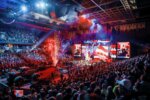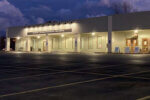They’re tattooed and pierced, and they keep ear plugs handy during worship. That’s how they like it at The Bridge, a punk church in Oregon that is reaching the younger generation with loud music and God’s love.
As the sun breaks through gray clouds over Portland, Ore., a small group of people are gathered outside the door of an old warehouse in the city’s business district.
“Welcome!” someone calls from the group, greeting a person who has just walked up. The voice is that of a young man dressed in torn jeans and a flak jacket that brims with chains and round, colored pins that bear the names of his favorite bands. He steps away from the crowd to introduce himself, and his spiked blond mohawk, body piercings and tattoos identify him as a punk.
His outstretched hand and warm smile identify him as friendly.
“My name’s Gecko,” he says. The others join in the greeting, and a bridge is instantly formed between the newcomer and the group of counterculture Christians who have come to the scruffy-looking building to worship God.
The friendly exchange is appropriate, since this is The Bridge–the aptly named church started Sept. 27, 1998, by three middle-aged baby boomers whose specific goal is to pastor and meet the needs of a young and searching “Generation Y” population. Gecko is one of that younger generation. He was born a crack baby and raised in a home where alcohol and drugs took priority over any other needs the family had.
Today, at age 19, he hovers near the door waiting for what he calls his “double-dose” of Jesus. In that regard he’s different from most of his punk peers, who shun the idea of going to churches because they often don’t feel welcomed in them.
“This is the only church where I’m accepted,” Gecko admits.
He turned to Christ in December 1998, and although he has experienced rejection from the mainstream church ranks, he has never let go of his commitment to Jesus.
“I heard about this place from a friend of mine,” he says. “I love to worship, and
I love the people. They don’t care about piercings and tattoos. They care about what’s in your soul.”
Inside the Meow Meow
If they weren’t more concerned about the inner person than the outer appearance, The Bridge staff probably would not have made it their present ministry. That’s because the punk “look”–though there are many exceptions–has historically been an imposing one: radically cropped or bleached hair, tattoos, black leather, T-shirts, chains or studded clothes, and lace-up military-style boots. And the look has been in keeping with the culture’s origins.
Historically “punk” is a counterculture that coalesced primarily in a generation of anti-establishment youth from England’s working-class in the 1960s. Its appeal has been embraced in one form or another in the United States since about the latter 1960s, and in the 1970s bands like the Sex Pistols gave many Americans their first introduction to punk. Music is a core element, and it’s usually played hard, loud and very fast.
Gecko is just one of the many punks, proud of their against-the-grain identity, who frequent The Bridge, a church of about 150 that’s pastored by the baby boomer trio of 55-year-old Ken Loyd–a Richard Dreyfuss look-alike with spiked gray hair–his wife Deborah, 49, and their friend Crystal Ward, 38. Their congregation meets in the warehouse, which stands near Portland’s Burnside Bridge and is distinct from the other structures around it only in its purpose.
Three days a week, the facility doubles as a punk-rock club called the Meow Meow. It’s run by Bridge members who are always ready to answer questions about Christianity or to walk through difficult circumstances with the people who attend.
“We don’t proselytize,” Deborah emphasizes.
Inside the building’s street-level doorway, a diverse array of people climb the dark stairway to the top floor of the warehouse that double-duties as church and nightclub. A basket full of complimentary ear plugs sits next to the coffee at the top of the stairs.
Inside the club it’s dark and dingy, but also daring–that is, filled with people daring to break the “norm” to reach those who don’t fit the norm and daring to worship the Lord with music so loud that some of them opt for the free ear plugs. Lights flash from exposed wooden beams as people mingle and greet one another around the concrete-block room, and Gecko notes that the band is playing in the style of the Christian punk band The Pirates.
“They’re great, but we write a lot of our own stuff too,” he announces, then begins to dance with others gyrating on a small dance floor at the front of the room. As bodies sway, some of the congregation create artistic works on paper attached to the wall. Others worship from rows of folding chairs, arms outstretched.
Here there are no white shirts with ties, no Sunday dresses and no barber-fresh haircuts. The Bridge is not your grandparents’ church.
Called to the young, disenfranchised and broken, pastor Ken Loyd uses plain English and a dose of rock ‘n’ roll to reach his congregation. Sometimes he offers a humorous spoonful of daily news to lighten their load–a tactic, he says, that is very well-received.
“I use things in my magic bag of tricks to hit home points,” he says.
At a break in the music, a woman’s voice rings through the sound system: “Jesus is not going to dump on you. He set you free. Now what are you going to do with that freedom?”
Pastor Deborah Loyd is preaching, but her slam-dunk slice of Christianity lasts only about 7-1/2 minutes. “This is a video-bite generation,” she explains. “That’s about all they can hear at a time.”
Ken, Deborah and Crystal share the “sermon” time at Sunday and Wednesday services. They are the moms and the pop of this congregation of young people.
“The word is spreading,” says Crystal, who met her husband, Michael, at the church. “We’re into hearts and saving souls.”
Unfiltered Christianity
The trio of pastors hail from Everett, Washington, where Ken pastored in the nondenominational but traditional All Nations Christian Center. Deborah taught physical education at the church’s school, and Crystal was the principal.
“We began to notice subculture types who were attracted to Christianity but for whom traditional Christianity didn’t work,” Deborah says. The transition from traditional in Everett to punk in Portland came out of hours of prayer as well as a desire to serve a culture “nobody wants,” she adds.
“There are a lot of words we have to redefine–prosperity, ministry, righteous, holy,” she says. “We strive to make them real by our outreach. And we embrace women’s roles in the church, something Jesus did in His preaching years.”
To fill community needs as well as congregational hearts, The Bridge runs the Atomic Circus, a youth group that attracts “sofa surfers”–homeless youth who float from home to home, couch to couch. The church also operates an art studio to provide a creative outlet for new Christians, and offers men’s and women’s groups, a biweekly dance, and a mission outreach to Mexico.
One Bridge member named Kim Nicholson, a mother of nine, changed her attitude toward those she considered outsiders when her oldest son bought into “grunge”–a subgenre of 1990s punk rock, with its own anti-fashion statement that differed from punk’s. The grunge “look” was characterized by scruffy long hair, untucked plaid-flannel shirts, tattered sweaters and stocking caps.
“I watched them win hearts [for Jesus] by how they were dressed,” Nicholson says of her son and his friends. “As a parent, I had to let go of the way they looked.” When she let go, God let loose.
Today Nicholson leads an alternative youth ministry that reaches out to more than 45 at-risk teens in Vancouver, Washington. The group has been meeting at Calvary Baptist Church for more than a year.
“They call themselves, ‘God Tricked Us,’ because they say He tricked them into changing their lives,” Nicholson says. “What He didn’t trick them into changing right away was their lifestyle. They’re still street kids using street language, but now they have a future.”
Her “kids” are just reaching a point at which they can grow spiritually and emotionally. “We start with the basic gospel, undoing a lot of myths about who Jesus Christ is,” she says. “Then we add who they are in Him. Now the kids know what He offers them–His heart, salvation.
“We’re trying to help these kids get unstuck from theology and on the right road to relationship,” she adds.
The Bridge’s evangelistic approach, Deborah says, “disciples people into salvation.”
“There’s a bias in Portland against God created by churches who lost sight of Jesus’ message to love one another,” she says. “We have to let our kids know we love them.”
The Bridge currently is pressing forward on an upcoming plan to reach as many of downtown Portland’s street kids as possible.
“A policeman told us, ‘Gather one… and word will get around,'” Deborah says. “Now we have a corps of about 40 leaders, a safety net to catch these kids before they have problems.”
To help, City Bible Church in Portland sends their youth group to interact with their peers at The Bridge. The Loyds and Ward say their church is also hooked into a network of local churches that offer accountability, financial assistance and counseling. Unlike the congregants The Bridge serves, the ministry itself hasn’t encountered much local resistance, the pastors agree.
“On a grand scale, we want to sculpt a new kingdom based on acceptance and love, but we’re asking our young people what that looks like,” Ken says.
The Bridge leaders want people under 30 to have a “viable look at God without the filter of organized religion.” It’s a concept they believe is as old as Jesus’ travels as a young preacher and as new as the Meow Meow on their front door.
“Everything’s about community,” Ken says. “Community brings life. These kids learn, grow and change at such a rapid rate, they just crash into new life. People once living on the streets or five or six to a house are stepping out, getting jobs, buying houses and cars.
“One of them, who is 27, never earned more than $5,000 a year and is now married, earning a living and a homeowner. It’s such a privilege to see.”
Financing The Bridge would be easier if more congregants tithed, but tithing remains on the back burner for now, the pastors agree. “Mostly the core members tithe, and we’ve started fund raising,” Deborah says. “We’re actively looking for supporters.”
Putting their own community ideals to work, the Loyds bought a four-unit apartment complex in one of the seediest areas of northeast Portland. Ken and Deborah live there, as well as their 21-year-old daughter Stephanie–one of the couple’s four adult children–and others from the church. All four units are occupied by Bridge members.
“We’re a Christian home, a light in our community,” Deborah says.
Community also is a quality the pastors believe will shape the future character of their ministry. “We expect to build 10 Bridges in 10 years,” Ken says, “each with their own flavor and culture.”
The trio of pastors hope to form an integrated community of Christians who can reach the lost, the homeless, the different.
“Someone has to guide that generation,” Deborah says. “We have the guts to wade into it.”
Mary Owen is a frequent contributor to Charisma. She lives in Salem, Ore. For more information about The Bridge e-mail [email protected] or call (503) 230-2111.






Leave a Comment
You must be logged in to post a comment.